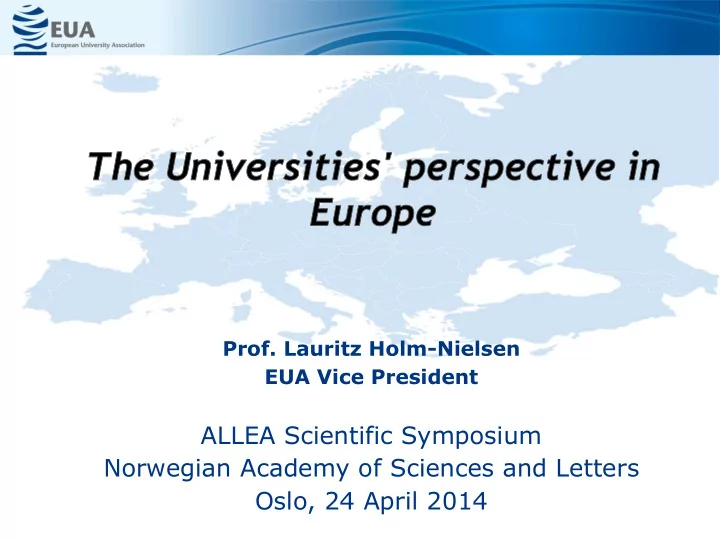

Prof. Lauritz Holm-Nielsen EUA Vice President ALLEA Scientific Symposium Norwegian Academy of Sciences and Letters Oslo, 24 April 2014
Universities are essential stakeholders in building an European Research Area (ERA) Embedded in cities and regions, they enable social and economic development Implement diverse missions in education and research Educate knowledge workers and researchers Able to foster interdisciplinary research skills and expertise Are focal points for dialogue and knowledge exchange with society Build international cooperation upon institutional historical and cultural links, strengths and capacities Universities building the ERA: governance and implementation go hand in hand … 2 … … 2 …
EUA as the Voice of European Universities - Statements to ERA and Horizon 2020 policy development Developed in wide consultation with its members: Smart People for Smart Growth: Statement by the European University Association on the EU Flagship Initiative “Innovation Union” of the Europe 2020 European Strategy for Smart, Sustainable and Inclusive Growth, 3 rd February 2011 EUA position on the EC “Green Paper” on a Common Strategic Framework for EU Research and Innovation Funding; 10 th May 2011 EUA position on the EC consultation document on the “ERA Framework”, 30 th November 2011 EUA Input to the Debate on the Rules for Participation in Horizon 2020, 10 th May 2012 Memorandum of Understanding between EUA and the European Commission, 17 th July 2012 Statement addressed to Heads of State and Government attending the “EU Budget Summit”, 8 th November 2012 Statement sent to EU Irish Presidency Chair of trilogue negotiations between Council, European Parliament and European commission, February 2013 … 3 …
Summary of main points on EUA’s statements to ERA and Horizon 2020 • Excellence, simplification, open competition, European added- value, cost model flexibility, transparent evaluation processes • “Bottom - up” funding instruments must be strengthened to support basic science (European Research Council, Marie Curie Actions and Future Enabling Technologies Programme) • Essential contribution of the social sciences, arts and humanities should be retained and strengthened, particularly in addressing Grand Challenges • Greater synergy between Competition policy (Horizon 2020) and European Structural and Investment Funds (ESIF) dedicated to research and innovation … 4 …
Policies concerning early stage researchers • Early Stage Researchers (ESRs) have been important for EU research policies for a number of years European Charter for Researchers and the Code of Conduct for the Recruitment of Researchers (aka The Charter and Code) 2005 Human Resource Strategy for Researchers – HRS4R – aims at implementation of the Charter and Code Commitment to doctoral education in the Innovation Union, 2010 • EUA has followed this and launched its own initiatives EUA Council for Doctoral Education DOC-CAREERS projects … 5 …
Challenges • Employment status during doctoral education – no coherence (source EUA ERA Survey 2013) Sweden Denmark Norway Austria Netherlands Serbia Finland Switzerland France Poland Germany Slovenia Fellowship (public funding, university Belgium funds) Croatia Iceland Spain Student Turkey Russia Hungary Slovakia Bulgaria Employed (by university or business) Czech Republic FYR Macedonia Greece Estonia United Kingdom Self-employed Portugal Lithuania Romania Italy Others (none, other e.g. non-university Ukraine Andorra research institution) Bosnia and Herzegovina Georgia Ireland Latvia
Challenges continued • ESRs have precarious positions in a very competitive environment The academic careers begins with fixed-term contracts often based on competitive funding Problems with social rights such as pension Coincides with ’the rush hour of life’ – establishing families creates gender imbalances Unsure future • Though doctorate holders generally have good jobs, the research career is difficult Only an estimated 10%-15% remain in academia all of their life • Making the research career attractive is a major challenge … 7 …
Doctoral education in the ERA • Doctoral education is at the crossroads of all these policies It is the entrance to the research career – so it should be attractive There are challenges with the implementation of the Charter and Code • Status as research professionals – legally and culturally • Social rights (pension, social rights) Doctoral education should cultivate researchers able to deal with the big challenges. It should foster • Innovation/application • Interdisciplinarity • International horizon and intercultural skills … 8 …
Towards ERA waves of reforms: the case of Denmark • Human capital formation system – PhD , post docs, and early career pathways • Funding system - performance contracts and competitive funding • Governance and management – external boards, appointed leaders, advisory academic councils • Structural change – fewer larger institutions, renovation of all university labs, road map for research infrastructure investments • Education programs – Bologna process, efficiency, relevance and quality Government targets: 95% post secondary education, 65% higher education, 25% research based HEd, 3% in PhD programmes
Thank you for your attention! Lauritz B. Holm-Nielsen lhn@adm.au.dk
Denmark’s reforms in a European context The Bologna European Higher The European Research Education Area: Declaration: Area: 10 years after the Bologna Governments working to Coordination of research and process. 47 countries have create coherent development activities in educational systems by Europe signed the Bologna Declaration. 2010. Signed by 29 DK: Research countries. AU Acad. Dev. Commission and OECD DK: Globalisation Process: Review Council • Unified management • Interdisciplinarity 2010 2005 2000-02 2003 1999 1986-91 1991 2003 2006-08 1 reform of doctoral 2 The Danish National 3 Management and 4 Structural reform: governance • 28 institutions become 8 education Research Foundation: reforms: universities and 3 • The research academy (Fundamental “blue sky”) • The PhD Decree and Strategic research • The new University departments • 3 +2+3, 4+4, 3+5 programmes : Act (2003, 2011) • 90 colleges become 8 Environment, food, • Reform of research university colleges funding system biotech, materials technology
Recommend
More recommend